North America trade pact deals rare setback to big pharma
![[Photo Credit: canva.com]](https://altoday.com/wp-content/uploads/2018/10/Canva-Cure-Drug-Cold-Dose-The-Disease-Pharmacy-1024x683.jpg)
A revamped North American trade deal nearing passage in Congress gives both the White House and Democrats a chance to claim victory and offers farmers and businesses clearer rules governing the vast flow of goods among the United States, Canada and Mexico. But the pact leaves at least one surprising loser: the pharmaceutical industry, a near-invincible lobbying powerhouse in Washington. To satisfy House Democrats, the Donald Trump administration removed a provision that would have given the makers of ultra-expensive biologic drugs 10 years of protection from less expensive knockoffs. Democrats opposed what they called a giveaway to the industry that could have locked in inflated prices by stifling competition. Top examples of the injected drugs made from living cells include medications to fight cancer and immune disorders such as rheumatoid arthritis. “This is one of the first times we’ve actually seen pharma lose,” said Rep. Earl Blumenauer, an Oregon Democrat who leads a subcommittee on trade. “They have a remarkable track record because they are a huge political force. They spend lots of money on lobbying, on advertising, on campaign contributions. But we held firm, and we won on all counts.” The removal of the provision also helped illustrate just how potent a political issue sky-high drug prices have become. It was a reminder, too, that President Donald Trump repeatedly pledged to work to lower drug prices. Last week, drug manufacturers absorbed another — though likely only temporary — defeat when House Democrats passed legislation, along party lines, that would authorize Medicare to use its influence in the marketplace to negotiate lower prices from drug companies. The bill is thought to have no chance of passage, though, in the Republican-led Senate. Yet the revamped U.S.-Mexico-Canada Agreement, Trump’s rewrite of the 25-year-old North American Free Trade Act, seems set to clear Congress without the biologics protection that the drug industry had sought. On Tuesday, the House Ways and Means Committee approved the legal text. The full House is expected to approve it Thursday, though the Senate isn’t likely to take it up until January. “It’s not a mystery,’’ said Rep. Jan Schakowsky, an Illinois Democrat who helped negotiate with the administration. “If you poll the American people, the cost of pharmaceuticals is a really big deal. It’s at the top of the list.’’ The trade agreement the administration reached last year with Mexico and Canada gave biologics 10 years of protection from cheaper near-copies known as biosimilars. Among the leading biologics are the anti-cancer drug Rituxan and Humira and Enbrel, which fight immune disorders. The industry — and the Trump administration — had argued that manufacturers of biologics require years of protection to profit from their drugs before biosimilars should be allowed to cut into sales. Otherwise, they contend, brand-name drug companies and biotech startups that rely on money from venture capital firms would have little incentive to invest in developing new medicines. “The announcement made today puts politics over patients,” the leading drug industry trade group, PhRMA, said in a statement last week. “Eliminating the biologics provision in the USMCA removes vital protections for innovators while doing nothing to help U.S. patients afford their medicines or access future treatments and cures.’’ The industry also rejected the notion that the biologics provision would keep drug prices high and hurt consumers. Existing U.S. law, they noted, already gives makers of biologics 12 years’ protection, more than the proposed 10 years in the USMCA. But the provision the Democrats succeeded in removing would have forced Mexico to expand biologics’ monopoly from five years and Canada from eight, potentially hurting U.S. consumers who seek lower drug prices in those countries. What’s more, Democrats argued, if Congress had expanded the biologics’ monopoly in the USMCA, it would have prevented lawmakers from ever scaling back that monopoly to, say, the seven years that the Obama administration had once proposed. “We would have been locked in,’’ Schakowsky said. For Big Pharma, the setback marked a sharp turnabout. Four years ago, the drug industry helped scuttle an Obama administration trade deal with 11 Pacific Rim countries, arguing that a provision establishing eight years of protection for biologics was not sufficient. Now the latest U.S. trade deal contains no biologics protections at all. Back in 2006, the industry scored a major victory when it helped push legislation through Congress that added prescription drug coverage for Medicare recipients but barred the government from negotiating lower prices. That restriction opened a “Pandora’s box” that paved the way for unsustainable price hikes, said Steve Brozak, an analyst at WBB Securities. Drug makers began raising prices of existing drugs several times a year, sometimes totaling more than 20% annually. They also started launching biologics with list prices topping six figures a year. In May, U.S. regulators approved a one-time gene therapy, Zolgensma, with an eye-popping price of $2.1 million per patient. A backlash has been growing, especially after news reports and congressional hearings exposed stories of patients rationing medicine and even dying because they couldn’t afford insulin or other drugs. Drugmakers have “been on defense more than we’ve ever seen,” said David Certner, legal counsel for AARP. Last year, Certner noted, Congress dealt the industry two losses: First, by increasing the discounts that drug makers must give to seniors with high drug costs who have landed in a Medicare coverage gap. Then, months later, lawmakers rejected industry efforts to reverse that change. And in January, the industry lost perhaps its biggest champion in Congress when Sen. Orrin Hatch, Republican-Utah, retired. Trump has long promised to address drug prices. On Wednesday, the administration moved ahead with a plan to allow Americans to safely and legally gain access to lower-priced medicines from abroad. So far, most of Trump’s drug-price initiatives have gone nowhere. His trade team negotiated biologics protections into the USMCA. Facing public anger, Democratic resistance and the fact that Canada and Mexico had no reason to support the protections for biologics, the administration yielded. When it reached a deal with House Democrats
Phil Kerpen: Let electric vehicle subsidies die on schedule

With the $7500 tax credit for electric car buyers already in the phase out period for the two biggest manufacturers – Tesla and GM – it’s no surprise that many Democrats in Congress are clamoring to lift the cap and keep the subsidies flowing. Unfortunately, several Republicans are joining the effort, creating unfortunate bipartisan support for a piecemeal version of the crackpot Green New Deal they have been rightly mocking and ridiculing. The so-called Drive America Forward Act would triple the existing cap on subsidies of 200,000 per manufacturer – massively expanding a program that was always supposed to be temporary and was originally premised on the national security rationale that it would lessen dependence on foreign oil – a now comically anachronistic concern when the United States has become a leading oil exporter. Moreover, while the Green New Deal is a socialist income leveling exercise in the guise of environmental policy, electric vehicle subsidies use environmental delusion as a cover for a wealth transfer from poor and middle income Americans to the rich who buy electric hobby cars as their third or fourth vehicle. Voters agree – with a recent poll showing 67 percent do not think their taxes dollars should help pay for electric vehicle subsidies. The Pacific Research Institute looked at IRS data and found that more than half of the electric car buyers claiming the credit make more than $200,000 per year and nearly 80 percent make more than $100,000. Just 1 percent make $50,000 or less. There is also a geographic dimension to the wealth redistribution. The most recent industry data shows that nearly half of all electric vehicles sold in the United States are sold in California, which has its own lavish subsidies at the state level. A September 2018 NERA Economic Consulting study looked at the economic impact of eliminating the cap and found that the costs outweigh the benefits. The study finds total household income falling as a consequence of lifting the cap by $7 billion in 2020 and $12 billion in 2035, which is about $50 to $70 per household in lost income every year. That’s a cost of over $50 every year to middle-income Americans to pay for subsidies for rich people in California. Orrin Hatch, the original sponsor of the bill, explained the logic behind the cap in 2007: “I want to emphasize that like the tax credits available under current law for hybrid electric vehicles, the tax incentives in the FREEDOM Act are temporary. They are needed in order to help these products over the initial stage of production, when they are quite a bit more expensive than older technology vehicles, to the mass production stage, where economies of scale will drive costs down and the credits will no longer be necessary.” At the time, big subsidies for electric vehicles were justified based on the theory that they were needed to lessen American dependence on foreign oil. A decade later, America is the largest oil and gas producer in the world and electric vehicles are a mature enough technology that they should be left to succeed or fail on the preference of consumers, not politicians. Ironically, it is now electric vehicles that are vulnerable to strategic supply disruptions because they require rare earth minerals for their motors and batteries –the production of which is overwhelmingly controlled by China. Such resources also present moral issues, with the cobalt used for batteries sourced in part from Congo mines worked by children in hazardous conditions. Meanwhile, gasoline vehicles have become vastly more environmentally friendly and fuel efficient. In fact, a study last year from the Manhattan Institute found that widespread deployment of electric vehicles would only reduce greenhouse gas emissions by 1 percent – and would increaseemissions of SO2, NOx, and particulate matter. The bottom line: efforts to raise the cap are a cash grab that will force taxpayers to subsidize wealthy Californians for no presently valid reason. Congress should let the subsidy phase out as scheduled. Phil Kerpen a leading free-market policy analyst and advocate in Washington. Prior to joining American Commitment, Kerpen was the principal policy and legislative strategist at Americans for Prosperity for over five years. Kerpen is also a nationally syndicated columnist, chairman of the Internet Freedom Coalition, and author of the 2011 book Democracy Denied.
Brett Kavanaugh faces final round of questioning without missteps
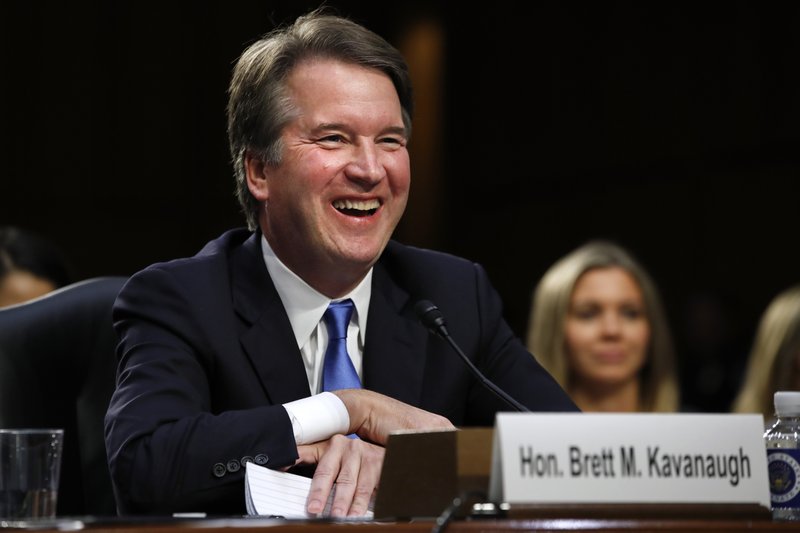
Senators will launch a final round of questioning of Brett Kavanaugh on Thursday, but after a marathon 12-hour session, President Donald Trump’s nominee to the Supreme Court appears to have avoided any major missteps that could trip his confirmation. So far, Kavanaugh does not seem to have changed minds on the Judiciary Committee, which is split along partisan lines. The judge left unanswered questions over how he would handle investigations of the executive branch and whether he would recuse himself if cases involving Trump under special counsel Robert Mueller’s probe end up at the court. His credibility may face new tests by senators who are seeking to make public some emails and documents from his Bush White House years that are being withheld by the committee as confidential. Trump says he’s pleased with his nominee’s televised performance, and Republicans are united behind him, eager to add a conservative judge to the court. The questioning of Kavanaugh has carried strong political overtones ahead of the November congressional elections. Democrats lack the votes to block confirmation, but have been pressing Kavanaugh for his views on abortion rights, gun control and other issues. Protesters have added to the challenges for Kavanaugh, repeatedly interrupting proceedings. “You’re more than halfway done,” Sen. Thom Tillis, R-N.C., told Kavanaugh as he gaveled the hearing closed late Wednesday. Pressured by Democrats with Trump on their minds during Wednesday’s grueling session, the judge insisted that he fully embraced the importance of judicial independence. But he refused to provide direct answers to Democrats who wanted him to say whether there are limits on a president’s power to issue pardons, including to himself or in exchange for a bribe. He also would not say whether he believes the president can be subpoenaed to testify. Still, he began his long day in the witness chair by declaring that “no one is above the law.” When Sen. Jeff Flake, R-Ariz., asked what constraints exist on executive power, the judge cited existing laws but also norms. “Norms are important. Historical practice is relevant to judicial decision-making,” he said. Democrats are concerned that Kavanaugh will push the court to the right and that he will side with Trump in cases stemming from Mueller’s investigation of Russian interference in the 2016 election and possible ties to the Trump campaign. The 53-year-old appellate judge answered cautiously when asked about most of those matters, refusing an invitation from Democratic Sen. Richard Blumenthal of Connecticut to pledge to step aside from any Supreme Court cases dealing with Trump and Mueller’s investigation. Under questioning by Republicans, Kavanaugh stressed the importance of judicial independence, “not being swayed by political or public pressure.” On abortion, Kavanaugh said the landmark 1973 Roe v. Wade decision that ensures access to abortion has been affirmed “many times.” He defended his dissenting opinion last year in the case of a pregnant immigrant teen in federal custody. Kavanaugh would have denied her immediate access to an abortion, even after she received permission from a Texas judge. Sen. Orrin Hatch, R-Utah, praised Kavanaugh for hiring female lawyers as clerks as a judge on the District of Columbia Court of Appeals, and then posed questions about whether Kavanaugh was aware of sexual harassment allegations against retired circuit court Judge Alex Kozinski in California. Kavanaugh, who considered the judge a friend and mentor, said he had known nothing about the allegations until they were disclosed last year. “It was a gut punch for me,” he said, and he was “shocked, disappointed, angry.” Kavanaugh also told Sen. Mazie Hirono, D-Hawaii, he was unaware of the domestic violence allegations against Rob Porter, who was Trump’s staff secretary. Journalist Bob Woodward’s new book about Trump says Kavanaugh recommended Porter for the job. Kavanaugh had served as staff secretary to George W. Bush and his work in the White House has figured in the hearing. Democratic senators have fought for access to documents from his three years as staff secretary, saying those could shed light on his views about policies from that era, including the detention and interrogation of terror suspects. Republicans have declined to seek the papers, and instead have gathered documents from his work as White House counsel to Bush. When questioned about the honesty of his 2006 testimony during his nomination for the appellate court when he said he was not involved in some Bush-era policies, Kavanaugh said he was “100 percent accurate.” Late Wednesday, Sen. Cory Booker, D-N.J., drew a rare partnership with Sen. Mike Lee, R-Utah, to release of some of the Bush-era documents. Lee complained that Booker was relying on an unreleased email to question Kavanaugh’s openness to racial profiling by police, but then agreed to work for its release. Republicans hope to confirm Kavanaugh in time for the first day of the new Supreme Court term, Oct. 1. Republished with the permission of the Associated Press.
Brett Kavanaugh in memo argued against indicting sitting president
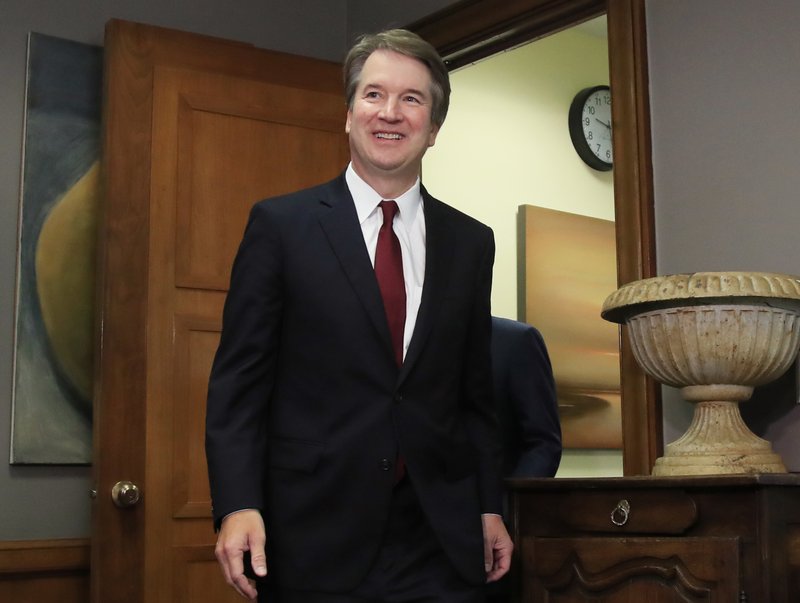
Confirmation hearings for Supreme Court nominee Brett Kavanaugh will begin the day after Labor Day, Republicans said, sparking Democratic objections that they are rushing the process without properly delving into his background. The announcement Friday came amid the release of new documents from Kavanaugh’s time on the Kenneth Starr team investigating Bill Clinton. The records reveal his resistance to issuing an indictment of a sitting president. On Christmas Eve 1998, Kavanaugh drafted an “Overall Plan” to colleagues providing his thoughts on bringing the independent counsel office’s work to a close and suggesting they inform the attorney general that the findings against Clinton be left to the next president. “We believe an indictment should not be pursued while the President is in Office,” Kavanaugh wrote. The memo, tucked toward the end of nearly 10,000 pages, provides greater insight into Kavanaugh’s views on executive power that are expected to feature prominently in the Senate confirmation hearings. Democrats have warned that Kavanaugh may be unwilling to protect special counsel Robert Mueller’s ongoing probe of Russian interference in the 2016 election. On Friday, Senate Majority Leader Mitch McConnell said he hopes to have President Donald Trump’s nominee confirmed to replace retired Justice Anthony Kennedy before the new court session begins Oct. 1. “We’re moving right along,” McConnell said during a radio interview in Kentucky ahead of the announcement. “He’ll get confirmed. It won’t be a landslide, but he’ll get confirmed.” The Judiciary Committee will hold up to four days of review, with Kavanaugh to begin facing questions on Day 2, Sept. 5, said committee chairman Sen. Chuck Grassley. Kavanaugh’s appearance will be followed by testimony from legal experts and people who know the judge. The White House, which is determined to have Kavanaugh confirmed before the November elections as Republicans aim to deliver on Trump’s priorities, applauded the schedule announcement. But Democrats want access to more documents from Kavanaugh’s past as a judge and as an official in the George W. Bush administration. Grassley, R-Iowa, said there’s “plenty of time” to review documents but now it’s time for Americans “to hear directly” from Kavanaugh. “He’s a mainstream judge,” Grassley said. “He has a record of judicial independence and applying the law as it is written.” So far, the committee has made public Kavanaugh’s 17,000-page questionnaire and his more than 300 court cases as an appellate judge. The panel has additionally received 174,000 pages from his work for Bush in the White House counsel’s office. The new documents Friday provide a glimpse into Kavanaugh’s years on the Starr team shuttling back and forth to Little Rock for “investigative purposes.” He co-wrote a detailed, nearly 300-page memo on deputy White House counsel Vince Foster’s suicide. Hundreds of pages in the Starr files are grand jury proceedings that are redacted. Meanwhile, most of the White House records related to Kavanaugh are being held on a “committee confidential” basis, with just 5,700 pages from his White House years released this week to the public. Democrats say the Republicans are relying on the cherry-picked files being released primarily by Bush’s lawyer, Bill Burck, who is compiling and vetting the documents, rather than the traditional process conducted by the National Archives and Records Administration. The Archives has said its review of some 1 million pages of Kavanaugh records the committee requested will not be fully available until the end of October. The Archives produced the Starr files. The top Democrat on the Judiciary Committee, Sen. Dianne Feinstein of California, said scheduling the hearing before the documents are ready “is not only unprecedented but a new low in Republican efforts to stack the courts.” She said, “It’s clear that Republicans want to speed this nomination through before we know who Brett Kavanaugh is.” Nan Aron, president of the Alliance for Justice, called it “jaw-dropping.” “It means that the chairman is telling the American people that this hearing is barreling forward, no matter what, no matter how little information is available to the Senate and public or how many shortcuts the committee has to take,” she said. The White House on Friday welcomed the news of a set date for confirmation hearings. “With the Senate already reviewing more documents than for any other Supreme Court nominee in history, Chairman Grassley has lived up to his promise to lead an open, transparent and fair process,” said White House spokesman Raj Shah. “Judge Kavanaugh looks forward to addressing the Judiciary Committee in public hearings for the American people to view.” Kavanaugh, 53, is a conservative who could tip the court’s balance for a generation and play a decisive role on issues like abortion access, gay marriage and executive branch oversight. He has met privately with almost all the Republican senators and one Democrat as supporters try to build momentum for confirmation. Because his career has largely been spent in public service, Kavanaugh has an unusually voluminous paper trail. Democrats are particularly pushing for access to his three years as staff secretary for Bush, but Republicans are not including those documents in the review. GOP Sen. Orrin Hatch of Utah said they are conducting the “most thorough vetting process for a nominee in the history of the Supreme Court.” Edwin Meese, the former attorney general to President Ronald Reagan, said, “Democratic senators have the time and they have the material. They have no excuse to obstruct his prompt confirmation.” Republished with the permission of the Associated Press.
GOP senators rave about Brett Kavanaugh; Dems prepare to grill him

Now that Supreme Court nominee Brett Kavanaugh has met privately with almost every Republican senator, it’s becoming increasingly clear President Donald Trump’s pick for the bench is running into little GOP resistance to confirmation this fall. The conservative appellate judge is breezing past swirling questions over his views on executive power and his approach to gay marriage, abortion and other legal issues. Kavanaugh left some Republicans with the impression that his earlier reluctance to investigate sitting presidents would not impede the Russia investigation of special counsel Robert Mueller. Other senators avoided such queries, preferring more of a get-to-know-you session with the 53-year-old judge to hear his story. Ask the GOP senators what they’re learning in their private chats and they’ll tell you the following: Kavanaugh loves his family. Lives for the law. And, like the president he once worked for, George W. Bush, he’s open and chatty, the kind of guy you’d like to have a beer with. “I just wanted to understand — try to understand — what’s in his heart,” said Sen. John Kennedy, R-La., who added that he was saving his legal questions for Kavanaugh’s confirmation hearings. “He impresses me as the sort of guy that would actually talk and get to know the people who clean his office.” The practice of Supreme Court nominees making “courtesy calls” to senators seems to have begun around 1970, according to the Senate Historical Office. That year, nominee Harry Blackmun made the rounds ahead of his confirmation hearing before the Judiciary Committee. Some senators use the visits to probe the nominee’s judicial philosophy, while others treat it more like a photo op. Since being nominated July 9, Kavanaugh has met with 47 senators — all but one of them Republican — at a rapid clip. The meetings have created growing momentum for Kavanaugh among Republicans that Democrats may be hard-pressed to stop. Even one early skeptic, Sen. Rand Paul of Kentucky, is now a yes vote. Still, the most challenging meetings for Kavanaugh are yet to come. Two key Republican senators, Lisa Murkowski of Alaska and Susan Collins of Maine, remain among the holdouts. They plan to meet with the judge this month. But even those two independent-minded senators, who both support abortion rights, may be unwilling to break with their party and prevent Trump from filling a second seat on the Supreme Court. Kavanaugh is also likely to meet with Democrats in mid-August, and they are certain to press the judge on a variety of hot-button issues. Only one Democrat,Joe Manchin of West Virginia, has met with Kavanaugh so far, and a person familiar with that session said Kavanaugh stressed his independence. The Republicans who have already met with Kavanaugh are leaving the meetings increasingly confident in Trump’s choice. Sen. David Perdue of Georgia said he asked the judge what he holds important. “We talked about how the partisanship really has created this gridlock and therefore it weakens us in terms of standing up,” said Perdue, a close ally of the president. “He says, ’Well, my desire all along has been to be a very studious defender of the Constitution and try to interpret the law, not make law.” Sen. Thom Tillis of North Carolina said he was satisfied that Kavanaugh’s earlier skepticism of special counsel investigations — like Mueller’s probe — was rooted in his work on Kenneth Starr’s team investigating Bill Clinton, rather than the events of today. “I don’t see how the two can be intertwined,” Tillis said. GOP Sen. James Lankford of Oklahoma said he did not broach the topic because he is already convinced Kavanaugh’s writings are not applicable to Mueller’s probe. “I didn’t take it that we shouldn’t do investigations. At all,” Lankford said. “The fact of the matter is Judge Kavanaugh is going to sit on the United States Supreme Court when we’re through,” said Sen. Orrin Hatch, R-Utah. Late last week, Democrats lost ground in their fight to unearth some 1 million documents related to Kavanaugh’s time as staff secretary at the Bush White House, a three-year stint on his resume that Republicans say is irrelevant to his qualifications for the court. Republicans have not asked for the records, and the National Archives has told Democrats it cannot process their request without GOP support. Kristine Lucius, the executive vice president for policy at the advocacy group The Leadership Conference on Civil and Human Rights, is pushing for the full release of the Kavanaugh documents and not those being handpicked by Republicans. She objects to “the notion that we would just have a curtain within three years of his record.” Democrats now plan to take their case directly to Kavanaugh, potentially turning the “courtesy calls” into cross-examination sessions of his thoughts on Bush-era topics like the detention of terrorism suspects and signing statements on legislation. Those subjects are likely covered in the documents Republicans refuse to seek. Republicans counter that there are already plenty of ways to scrutinize Kavanaugh’s record. He has handled more than 300 cases since 2006 as an appellate judge. Already the Judiciary Committee has requested some 125,000 files from Kavanaugh’s other years in the White House counsel’s office and 20,000 from his work on the Starr investigation. And with a 51-49 GOP majority in the Senate, narrowed with the longtime absence of the ailing Sen. John McCain, R-Ariz., Republicans will be able to confirm Kavanaugh if they hold together and prevent defections. GOP Sen. Deb Fischer of Nebraska said she was preparing a floor speech to deliver after her meeting with Kavanaugh, whom she found to be an incredibly open, honest man. “I don’t know how anyone could oppose him,” she said. “I really don’t.” Republished with the permission of the Associated Press.
Babies of senators now welcome in Senate chamber
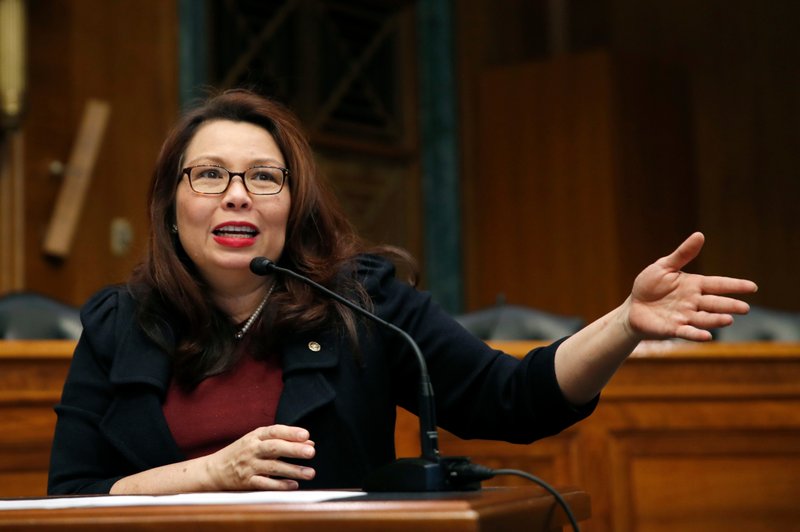
Who doesn’t like babies? No one in the Senate, apparently — at least not enough to block a historic rules change that passed Wednesday allowing the newborns of members into the chamber. Its passage without objection came despite plenty of concern, some privately aired, among senators of both parties about the threat the tiny humans pose to the Senate’s cherished decorum. “I’m not going to object to anything like that, not in this day and age,” said Sen. Pat Roberts, R-Kan., father of three and grandfather of six. He then noted that a person can stand in the door of the cloakroom, a lounge just off the chamber, and vote. “I’ve done it,” he said. Allowing babies on the Senate floor, he said, “I don’t think is necessary.” Sen. Orrin Hatch, the father of six, grandfather of 14 and great-grandfather of 23, said he had “no problem” with such a rules change. “But what if there are 10 babies on the floor of the Senate?” he asked. The inspiration for the new rule is a small bundle named Maile Pearl, born April 9 to Illinois Democrat Tammy Duckworth —the only sitting senator in U.S. history to give birth. In a statement, Duckworth thanked her colleagues for “helping bring the Senate into the 21st Century by recognizing that sometimes new parents also have responsibilities at work.” Their concerns and more were shared by Republicans and Democrats, according to interviews Wednesday. “It is a big change,” Sen. Amy Klobuchar, D-Minn., said in a telephone interview, as leaders of both parties sought to clear the new rule without objection, or public discussion. The private reassurances to members of both parties, she said, have “been going on for weeks.” Teleworking is not an option in the Senate, which requires members to vote in person. So Duckworth raised a rare question that split her colleagues more along generational lines than well-worn partisan ones. Duckworth proposed changing the rules to allow senators with newborns — not just Duckworth, and not just women — to bring their babies onto the floor of the Senate. This, recalled Klobuchar, did not go entirely smoothly for the two months she privately took questions about the idea and its potential consequences — diaper changes, fussing and, notably, nursing. Sen. Tom Cotton, father of two, said he has no problem with the rule change. But the Arkansas Republican acknowledged that some of his colleagues do, “so the cloakroom might be a good compromise.” Klobuchar’s answer to that suggestion noted that Duckworth lost both legs and partial use of an arm in Iraq, and mostly gets around by wheelchair. “Yes, you can vote from the doorway of the cloakroom, but how is she going to get to the cloakroom when it’s not wheelchair accessible?” she asked. Some senators proposed making an exception for Duckworth. But her allies said the Senate should make work easier for new parents. “We believe strongly, and she did, that it should be a permanent rules change.” Having 10 babies on the Senate floor, as Hatch suggested, “would be a delight,” Klobuchar said. “We could only wish we had 10 babies on the floor. That would be a delight,” retorted Klobuchar, noting that such a conflagration would probably mean more young senators had been elected in a body where the average age of members tops 60. There was more, voiced privately, Klobuchar said — including whether Duckworth intended to change Maile’s diaper or nurse her new baby on the Senate floor. Most senators, though, were supportive, Klobuchar said. Majority Leader Mitch McConnell, R-Ky., and Rules Committee Chairman Roy Blunt, R-Mo., both fathers, helped or did not stand in the way. McConnell did not answer a reporter’s question Wednesday about whether he had any concerns about babies on the Senate floor. Several others were happy to voice support for the rules change, and could not resist taking a jab at their colleagues. “Why would I object to it? We have plenty of babies on the floor,” joked Sen. Marco Rubio, R-Fla. But there still was some confusion. Just after the unanimous vote, Sen. Dick Durbin, D-Ill., said it would do the tradition-bound Senate some good to see “a diaper bag next to one of these brass spittoons, which sit on the floor, thank goodness, never used.” Oklahoma Republican James Inhofe took issue with that, saying: “They don’t use diaper bags anymore. They’re disposable diapers.” Diaper bags are generally used to carry clean diapers and other supplies when parents and babies go out. Sometimes, they hold dirty naps until they can be disposed of. Republished with the permission of the Associated Press.
Congress seen as not likely to pass tax overhaul quickly

After their humiliating loss on health care, Republicans in Congress could use a quick victory on a big issue. It won’t be an overhaul of the tax code. Overhauling the tax code could prove harder to accomplish than repealing and replacing Barack Obama‘s health law. Congressional Republicans are divided on significant issues, especially a new tax on imports embraced by House Speaker Paul Ryan. And the White House is sending contradicting signals on the new tax, adding to the uncertainty. House Republicans also can’t decide whether to move on from health care. Ryan canceled a scheduled vote on a House GOP plan after it became obvious that Republicans didn’t have the votes. He said he will continue to work on the issue but one of his top lieutenants on health care, Rep. Kevin Brady, R-Texas, says he is now “100 percent” focused on a tax overhaul. Ryan says Congress can work on both at the same time. It won’t be easy. Here’s why: ___ REPUBLICAN DIVIDE House and Senate Republicans largely agree on the broad outlines of a tax overhaul. They want to lower tax rates for individuals and corporations, and make up the lost revenue by scaling back tax breaks. But they are sharply divided on a key tenet of the House Republican plan. The new “border adjustment tax” would be applied to profits from goods and services consumed in the U.S., whether they are domestically produced or imported. Exports would be exempt. House GOP leaders say the tax is key to lowering the top corporate income tax rate from 35 percent to 20 percent. But good luck finding a single Republican senator who will publicly support the tax. Sen. Rob Portman, R-Ohio, is the latest in a long line of Republican senators to come out against the tax. ___ ABSENT DEMOCRATS Senate Finance Committee Chairman Orrin Hatch, R-Utah, says he wants to work with Democrats to overhaul the tax code. “A bipartisan bill would allow us to put in place more lasting reforms and give the overall effort additional credibility,” Hatch said. Majority Leader Mitch McConnell, R-Ky., has said it is bad policy to pass major legislation without bipartisan support. “Without some meaningful buy-in, you guarantee a food fight,” McConnell wrote in his memoir last year. “You guarantee instability and strife.” But in the House, Republicans haven’t reached out to Democrats in any meaningful way. ___ WHERE’S THE WHITE HOUSE? “Obviously we’re driving the train on this,” White House press secretary Sean Spicer said. But President Donald Trump‘s administration has been all over the map on tax reform. Trump at one point said the House border tax is too complicated, then said it’s in the mix. Treasury Secretary Steven Mnuchin told a Senate panel that “there would be no absolute tax cut for the upper class” in Trump’s tax plan. However, the plan Trump unveiled during his presidential campaign would provide big tax breaks to high-income households. Since taking office, Trump has promised “massive” tax cuts for the middle class. A former Treasury official under President Barack Obama says the White House needs to stake out clear goals on tax overhaul to guide the debate in Congress. “I think it’s important for the administration to signal early the general shape” of what they would like to accomplish so that there are fewer proposals vying for attention, said Michael Mundaca, a former assistant Treasury secretary now at Ernst & Young. ___ TAX CHANGE IS DIFFICULT There is a reason it’s been 31 years since the last time Congress rewrote the tax code. Since then, the number of exemptions, deductions and credits has mushroomed. Taxpayers enjoyed $1.6 trillion in tax breaks in 2016 — more than the federal government collected in individual income taxes. That huge number could provide plenty of tax breaks that lawmakers can scale back so they can lower tax rates significantly. There is just one problem — all of the biggest tax breaks are very popular and have powerful constituencies. Nearly 34 million families claimed the mortgage interest deduction in 2016. That same year more than 43 million families took advantage of a deduction of state and local taxes. The House Republicans’ tax plan would retain the mortgage deduction and eliminate the deduction for state and local taxes. ___ HEALTH CARE Both Trump and Republicans in Congress made big campaign promises to repeal and replace Obama’s health law, so the issue won’t go away. However, several players say negotiations on a way forward are non-existent. In the meantime, Trump is stoking animosity among a key voting bloc by criticizing them on Twitter. Two factions in the House GOP had members oppose the health plan: the hard-right Freedom Caucus and the moderate Tuesday Group. Ryan has suggested that they get together to sort out their differences, but it’s not happening, according to one key lawmaker. “We are not currently negotiating with the Freedom Caucus. There was never a meeting scheduled with the Freedom Caucus. We will never meet with the Freedom Caucus,” said Rep. Chris Collins, R-N.Y., a member of the Tuesday Group. Trump tweeted: “The Freedom Caucus will hurt the entire Republican agenda if they don’t get on the team, & fast. We must fight them, & Dems, in 2018!” To quote a favorite saying of the president, Not nice. Republished with permission of The Associated Press.
House GOP releases bill replacing Barack Obama health care overhaul
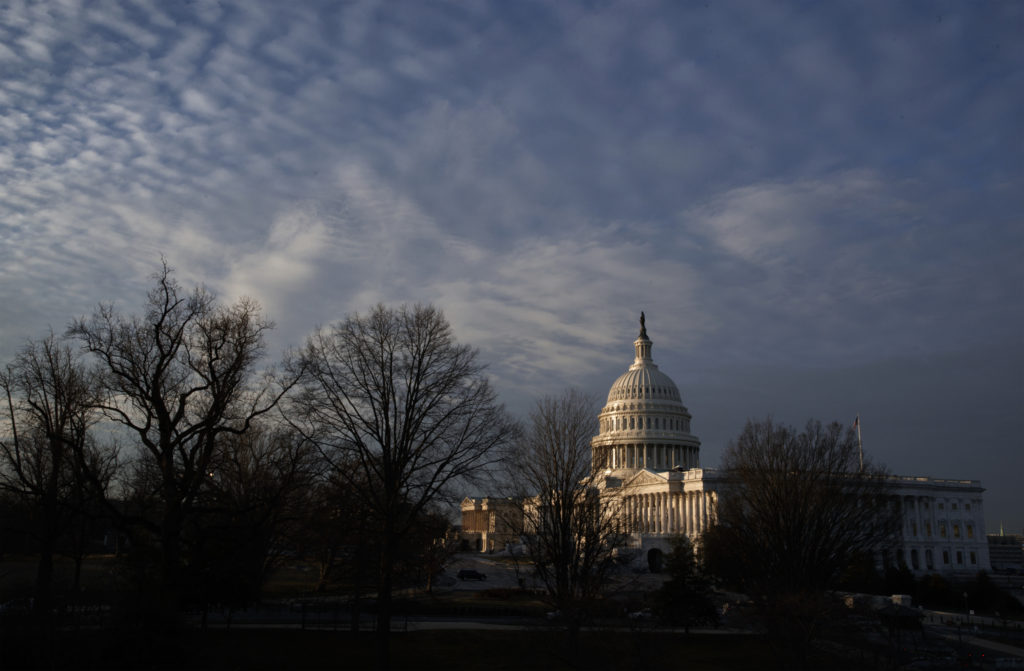
House Republicans on Monday released their long-awaited plan for unraveling former President Barack Obama‘s health care law, a package that would scale back the government’s role in health care and likely leave more Americans uninsured. House committees planned to begin voting on the 123-page legislation Wednesday, launching what could be the year’s defining battle in Congress and capping a seven-year Republican effort to repeal the 2010 law. Though GOP leaders expect their measure to win the backing of the Trump administration, divisions remain and GOP success is by no means ensured. The plan would repeal the statute’s unpopular fines on people who don’t carry health insurance. It would replace income-based subsidies the law provides to help millions of Americans pay premiums with age-based tax credits that may be less generous to people with low incomes. Those payments would phase out for higher-earning people. The bill would continue Obama’s expansion of Medicaid to additional low-earning Americans until 2020. After that, states adding Medicaid recipients would no longer receive the additional federal funds the statute has provided. More significantly, Republicans would overhaul the federal-state Medicaid program, changing its open-ended federal financing to a limit based on enrollment and costs in each state. In perhaps their riskiest political gamble, the plan is expected to cover fewer than the 20 million people insured under Obama’s overhaul, including many residents of states carried by President Donald Trump in November’s election. Republicans said they don’t have official estimates on those figures yet. But aides from both parties and nonpartisan analysts have said they expect coverage numbers to be lower. House Speaker Paul Ryan, R-Wis., said the bill would “drive down costs, encourage competition, and give every American access to quality, affordable health insurance.” He added, “This unified Republican government will deliver relief and peace of mind to the millions of Americans suffering under Obamacare.” But besides solid opposition from Democrats, there were signals galore that Republican leaders faced problems within their own party, including from conservatives complaining that the measure isn’t aggressive enough in repealing parts of Obama’s law. “It still looks like Obamacare-lite to me,” said Sen. Rand Paul, R-Ky., among three Senate conservatives who have criticized the emerging GOP bill. “It’s going to have to be better.” The Republican tax credits — ranging from $2,000 to $14,000 for families — would be refundable, meaning even people with no tax liability would receive the payments. Conservatives have objected that that feature creates a new entitlement program the government cannot afford. Senate Finance Committee Chairman Orrin Hatch, R-Utah, wouldn’t rule out changes in the measure by his chamber, where significant numbers of moderate Republicans have expressed concerns that the measure could leave too many voters without coverage. “The House has the right to come up with what it wants to and present it to the Senate by passing it. And we have a right to look it over and see if we like it or don’t,” Hatch told reporters. Underscoring those worries, four GOP senators released a letter to Senate Majority Leader Mitch McConnell, R-Ky., shortly before the bill was unveiled. They complained that an earlier, similar draft of the measure “does not provide stability and certainty for individuals and families in Medicaid expansion programs or the necessary flexibility for states.” Signing the letter were Sens. Rob Portman of Ohio, Shelley Moore Capito of West Virginia, Cory Gardner of Colorado and Lisa Murkowski of Alaska. Thirty-one states and the District of Columbia opted to expand Medicaid coverage under the law and accept beefed-up federal spending for the program. Around half those states have GOP governors, who are largely reluctant to see that spending curtailed. In another feature that could alienate moderate Republicans, the measure would block for one year federal payments to Planned Parenthood, the women’s health organization long opposed by many in the party because it provides abortions. It also forbids people receiving tax credits to help pay premiums to buy coverage under a plan that provides abortions. Republicans said they’d not yet received official cost estimates on the overall bill from the nonpartisan Congressional Budget Office. That office’s projections on the bill’s price tag and the number of people the measure would cover could be key in winning over recalcitrant Republicans, or making them even harder to win over. A series of tax increases on higher-earning people, the insurance industry and others used to finance the Obama overhaul’s coverage expansion would be repealed as of 2018. In a last-minute change to satisfy conservative lawmakers, business and unions, Republicans dropped a plan pushed by Ryan to impose a first-ever tax on the most generous employer-provided health plans. Popular consumer protections in the Obama law would be retained, such as insurance safeguards for people with pre-existing medical problems, and parents’ ability to keep young adult children on their insurance until age 26. Republished with permission of The Associated Press.
Dems force delays in votes on Jeff Sessions, Steve Mnuchin, Tom Price
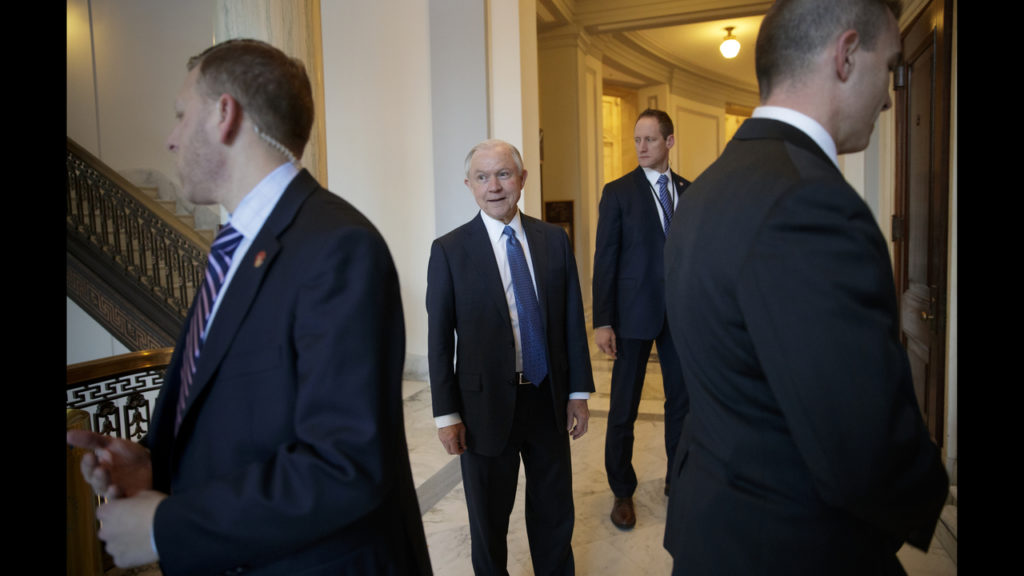
Democrats forced delays Tuesday in planned Senate committee votes on President Donald Trump‘s picks for Health and Treasury secretaries and attorney general, amid growing Democratic surliness over the administration’s aggressive early moves against refugees and an expected bitter battle over filling the Supreme Court vacancy. Democrats abruptly boycotted a Senate Finance Committee meeting called to vote on Rep. Tom Price, R-Ga., the Health nominee and Steve Mnuchin, Trump’s Treasury selection, saying both had misled Congress about their financial backgrounds. The Democrats’ action prevented the Finance panel from acting because under committee rules, 13 of its members — including at least one Democrat — must be present for votes. It was unclear when the panel would reschedule to votes. At the Senate Judiciary Committee, a meeting considering Sen. Jeff Sessions, R-Ala., to be attorney general lasted so long — chiefly because of lengthy Democratic speeches — that Chairman Charles Grassley, R-Iowa, said the panel would meet again Wednesday. The meeting on Sessions’ nomination was coming with Democrats and demonstrators around the country in an uproar over Trump’s executive order temporarily blocking refugees. Even some Republicans were warning it could hinder anti-terrorism efforts. Not everything ground to a halt. The Senate education committee voted 12-11 to send Trump’s pick to head the Education Department, Betsy DeVos, to the full Senate for a confirmation vote. The Senate Energy and Natural Resources Committee quickly approved former Texas Gov. Rick Perry as Energy secretary by 16-7, and Rep. Ryan Zinke, R-Mont., to head Interior by 16-6. And the full Senate easily confirmed Elaine Chao to become transportation secretary by a 93-6 vote. Chao was labor secretary under President George W. Bush, and is wife of Senate Majority Leader Mitch McConnell, R-Ky. Just before the Finance committee was scheduled to vote on Price and Mnuchin, Democrats called a briefing for reporters and announced their plan to force a delay. Sen. Debbie Stabenow, D-Mich., said Price and Mnuchin would hold positions “that directly affect peoples’ lives every day. The truth matters.” Finance Committee Chairman Orrin Hatch, R-Utah, accused Democrats of “a lack of desire to fulfill their constitutional responsibilities.” “They ought to stop posturing and acting like idiots,” he said. In 2013 when Democrats controlled the Senate, Republicans boycotted a committee vote on Gina McCarthy to head the Environmental Protection Agency, temporarily stalling it. Democrats cited one report in The Wall Street Journal that Price received a special, discounted offer to buy stock in a biomedical company, which contradicted his testimony to Congress. They said another report in The Columbus Dispatch showed documents revealing that Mnuchin had not been truthful with the Senate in the confirmation process in comments about how his bank OneWest had handled home foreclosures. Republicans have supported both men, and both have strongly defended their actions. Democrats have opposed Price, a seven-term congressional veteran, for his staunch backing of his party’s drive to scuttle Obama’s health care law and to reshape Medicare and Medicaid, which help older and low-income people afford medical care. They’ve also assailed Price for buying stocks of health care firms, accusing him of using insider information and conflicts of interest for backing legislation that could help his investments. Price says his trades were largely managed by brokers and that he’s followed congressional ethics rules. Democrats have criticized Mnuchin for not initially revealing nearly $100 million in assets, and were expected to vote against both nominees. They’ve also accused him of failing to protect homeowners from foreclosures and criticized him for not initially disclosing all his assets. DeVos, a wealthy GOP donor and conservative activist, has long supported charter schools and allowing school choice. That’s prompted opposition from Democrats and teachers’ unions who view her stance as a threat to federal dollars that support public education. Critics have also mocked her for suggesting that guns could be justified in schools to protect students from grizzly bears. Two prominent Republicans on the education committee, Sens. Susan Collins of Maine and Lisa Murkowski of Alaska, said they remained uncertain if they will vote for her on the Senate floor. Murkowski said DeVos has yet to prove that she deeply cares about America’s struggling schools and its children. Republished with permission of the Associated Press.
Republicans beginning to make peace with Donald Trump as nominee
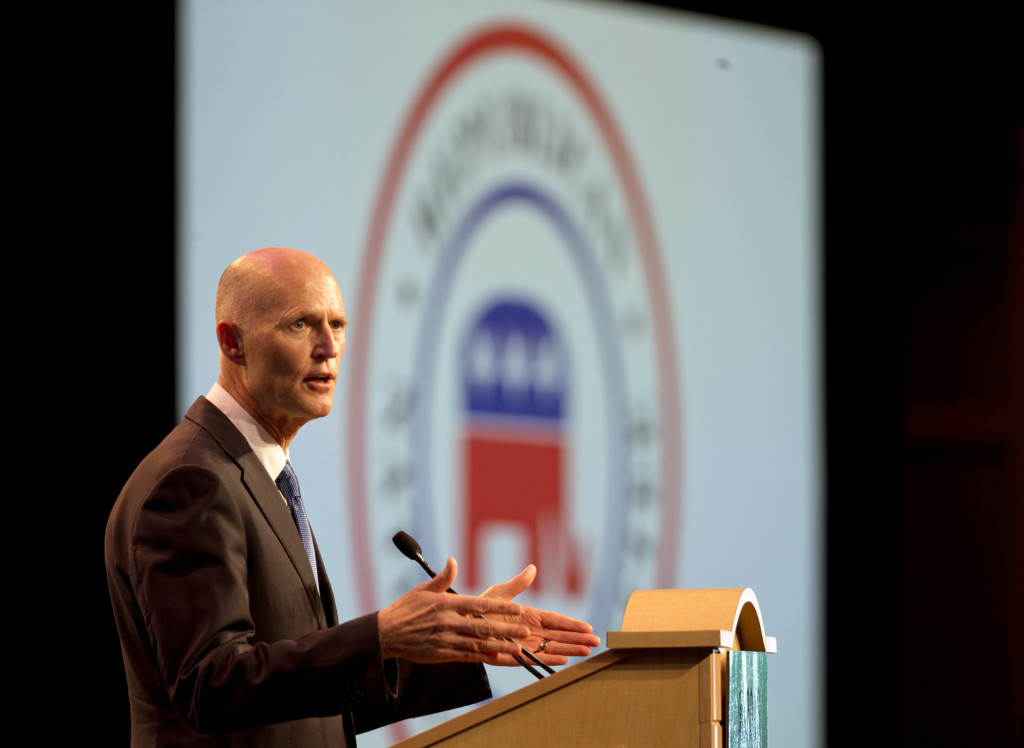
They thought it was impossible. Some still fear it. Others can barely believe it. But leading Republicans are beginning to accept the idea that Donald Trump will be their party’s presidential nominee. In the wake of the businessman’s commanding wins in five Eastern states this week, a growing number of national Republicans and GOP lawmakers on Capitol Hill say Trump has taken on an indisputable air of inevitability. Some argue they should get behind him now and abandon the “Never Trump” efforts still nursed by some establishment Republicans. Embracing Trump, these Republicans say, may be the GOP’s only hope of blocking Democrat Hillary Clinton in November. “Donald Trump is going to be our nominee,” Florida Gov. Rick Scott wrote on Facebook this week. “The Republican leaders in Washington did not choose him, but the Republican voters across America did choose him. The voters have spoken.” “Republicans now need to come together,” Scott wrote, warning that continued opposition to Trump “will be nothing more than a contribution to the Clinton campaign.” On Capitol Hill, support for Trump has also gotten markedly easier to find. “I don’t understand. I mean, it’s not ‘Never Trump.’ It’s ‘Never Hillary.’ Never, never, never Hillary. Come on. Wake up and smell the coffee,” said Rep. Mike Kelly of Pennsylvania, who earlier this week cast his ballot for Trump, along with all members of his large family and 57 percent of Republican primary voters in his state. “I’ve never seen a party attack one of its own candidates with this aggressiveness,” Kelly said of GOP establishment figures who oppose Trump, blaming it on an elitist Washington attitude out of touch with voters. Sen. Orrin Hatch of Utah, a respected senior member of the Senate, previously endorsed Jeb Bush and then Sen. Marco Rubio and said he doesn’t intend to endorse Trump. But Hatch said of Trump, “It looks to me like he’s going to win, and if he does, I’m going to do everything in my power to help him.” Some leading Republicans have forecast that a Trump candidacy could spell electoral disaster, help Democrats win back control of the Senate and even cost safe Republican seats in the House. They point to Trump’s disparaging comments about women and minorities that have contributed to high unfavorability ratings. Hatch, along with others, disagreed. “I think he could be great if he’ll get serious about being president, and I think he will,” Hatch said. “When he gets hit with reality that this is the toughest job in the world, he’s a clever, smart guy who I think will want to be remembered for doing good things, so I have a feeling he can make that transition.” On Thursday, Trump picked up endorsements from two House committee chairmen: Reps. Bill Shuster of Pennsylvania, who chairs the Transportation Committee, and Jeff Miller of Florida, who chairs Veterans Affairs. He talked foreign policy in a phone call with Sen. Bob Corker, R-Tenn., who heads the Foreign Relations Committee. Corker later was full of compliments about Trump, though he said he had no plans to endorse him. To be sure, not all are on board. Some in the GOP continue to cringe at the thought of vulnerable Senate Republicans and candidates getting linked to Trump’s provocative stances or attempting to distance themselves from them. “My feeling about Donald Trump is, I don’t think that that’s our best foot forward at all,” said Sen. Jeff Flake of Arizona, an outspoken Trump critic. “And I can’t imagine being forced to take some of those positions that he’s taken. A ban on Muslims, build a wall and make the Mexicans pay for it, you name it.” It remains uncertain whether Trump will amass the 1,237 delegates needed to clinch the nomination ahead of the Republican convention in Cleveland in July. If he does not, Texas Sen. Ted Cruz hopes to make a play to win the nomination as balloting progresses. Ohio Gov. John Kasich also remains in the race. Next week’s primary in Indiana, where polling suggests a close race, could be crucial in determining whether either Cruz or Kasich can continue to argue they have a path forward. Roger Villere, longtime Louisiana state GOP chief and one of the national party’s vice-chairmen, said a “clear supermajority” at the Republican National Committee spring meeting earlier this month in South Florida were warming to the idea of Trump as standard-bearer. “There were a lot of them who Trump wasn’t their first choice, but when we got in closed rooms and everybody started talking, the general consensus was that he’s going to be our nominee, and we will rally around him,” Villere said Friday. “I wouldn’t say it was even reluctance. It’s just the reality.” Offering a common party refrain, Villere added, “All of our possibilities are clearly superior to what the Democrats have.” Republished with permission of the Associated Press.
Congressional GOP beginning to accept Donald Trump as nominee
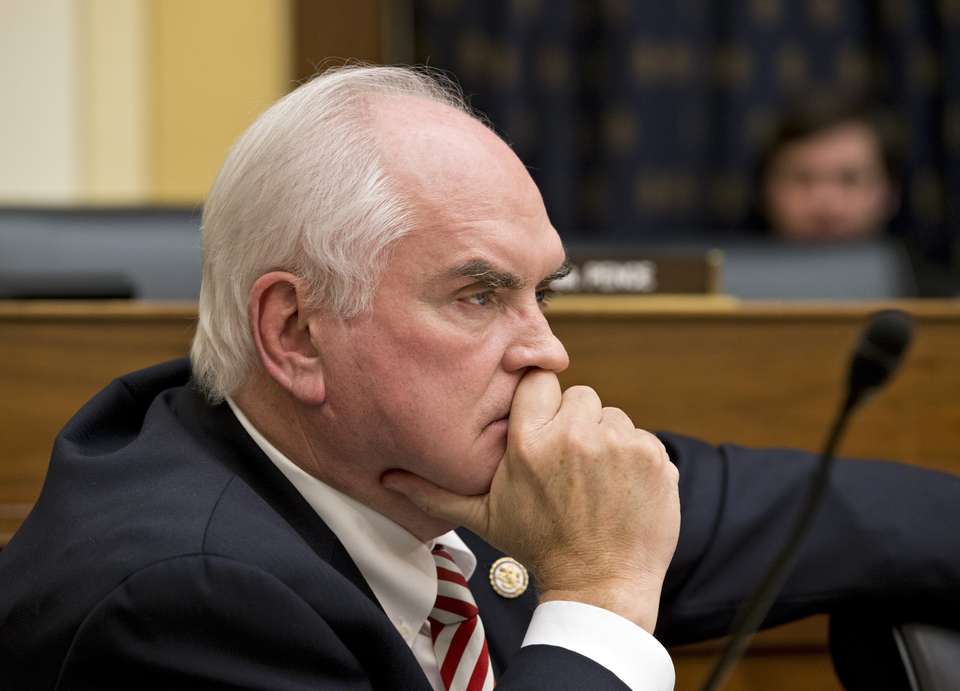
Congressional Republicans are beginning to accept, and even embrace, an outcome that was once unthinkable: Donald Trump as the GOP presidential nominee. In the wake of the businessman’s commanding wins in five Eastern states this week, a growing number of lawmakers say that Trump is taking on an air of inevitability. Some argue they should get behind him now instead of trying to stand in his way, as some establishment Republicans are still attempting to do by backing various “Never Trump” efforts. For some lawmakers, supporting Trump is seen as their only hope of stopping the Democrats’ likely candidate, Hillary Clinton, in November and ensuring a Democratic president doesn’t fill Supreme Court vacancies. “I don’t understand. I mean, it’s not ‘Never Trump.’ It’s ‘Never Hillary.’ Never, never, never, Hillary. Come on. Wake up and smell the coffee,” said Rep. Mike Kelly of Pennsylvania, who earlier this week cast his ballot for Trump, along with all members of his large family and 57 percent of Republican primary voters in his state. “I’ve never seen a party attack one of its own candidates with this aggressiveness,” Kelly said of GOP establishment figures who oppose Trump, blaming it on an elitist Washington attitude out of touch with voters. Sen. Orrin Hatch of Utah, a respected senior member of the Senate, previously endorsed Jeb Bush and then Sen. Marco Rubio and said he doesn’t intend to endorse Trump. But Hatch said Thursday of Trump: “It looks to me like he’s going to win and if he does I’m going to do everything in my power to help him.” Some leading Republicans have forecast that a Trump candidacy could spell electoral disaster, help Democrats win back control of the Senate and even cost Republicans seats in the House. They point to Trump’s disparaging comments about women and minorities that have contributed to high unfavorability ratings. Hatch, along with others, disagreed. “I think he could be great if he’ll get serious about being president, and I think he will,” Hatch said. “When he gets hit with reality that this is the toughest job in the world, he’s a clever, smart guy who I think will want to be remembered for doing good things, so I have a feeling he can make that transition.” To be sure, not all are on board, and some lawmakers cringe at the thought of vulnerable Senate Republicans and candidates getting linked to Trump’s controversial stances or attempting to distance themselves from them. “He’s looking more inevitable, yeah. I’ve been wrong all along,” said GOP Sen. Jeff Flake of Arizona, an outspoken Trump critic. “My feeling about Donald Trump is, I don’t think that that’s our best foot forward at all. And I can’t imagine being forced to take some of those positions that he’s taken. A ban on Muslims, build a wall and make the Mexicans pay for it, you name it.” It remains uncertain whether Trump will amass the 1,237 delegates needed to clinch the nomination ahead of the Republican convention in Cleveland in July. If he does not, Texas Sen. Ted Cruz hopes to make a play to win the nomination as balloting progresses. Ohio Gov. John Kasich also remains in the race. On Capitol Hill, Cruz remains an unpopular figure, having disparaged party leaders and led the charge to force a 16-day partial government shutdown in 2013 in a futile attempt to cut off money for President Barack Obama‘s health care law. Former House Speaker John Boehner, who resigned last fall under conservative pressure, lashed out at Cruz in comments published Thursday in Stanford University’s student newspaper, calling him “Lucifer in the flesh” and saying: “I get along with almost everyone, but I have never worked with a more miserable son of a bitch in my life.” Perhaps partly because of Cruz’s unpopularity, it’s getting easier to find leading lawmakers speaking publicly in favor of Trump. On Thursday, Trump picked up endorsements from House committee chairmen: Bill Shuster of Pennsylvania, who chairs the Transportation Committee, and Jeff Miller of Florida, who chairs Veterans Affairs. Sen. Bob Corker, R-Tenn., who heads the Foreign Relations Committee, spoke on the phone with Trump on Thursday and later told reporters they had a good and substantive conversation, though he has no plans to endorse him. On Trump’s foreign policy speech, Corker said: “Let’s face it, the foreign policy establishment in Washington hasn’t been exactly brilliant in their assessments of things, and I do like the fact that he’s challenging that status quo, I really do. … I think his campaign, like anybody who hadn’t been in the public arena before, is evolving.” Rep. Tom Rooney of Florida was a leading Rubio backer, but said now “it’s time to move on.” “The people have spoken. The Republican primary electorate has spoken so he deserves the opportunity to be our nominee,” Rooney said. “If he screws it up as the nominee and hurts the down-ballot ticket, then he screws it up. But right now the people want him to be the nominee.” Republished with permission of the Associated Press.
History shows Marco Rubio resignation would be rare event
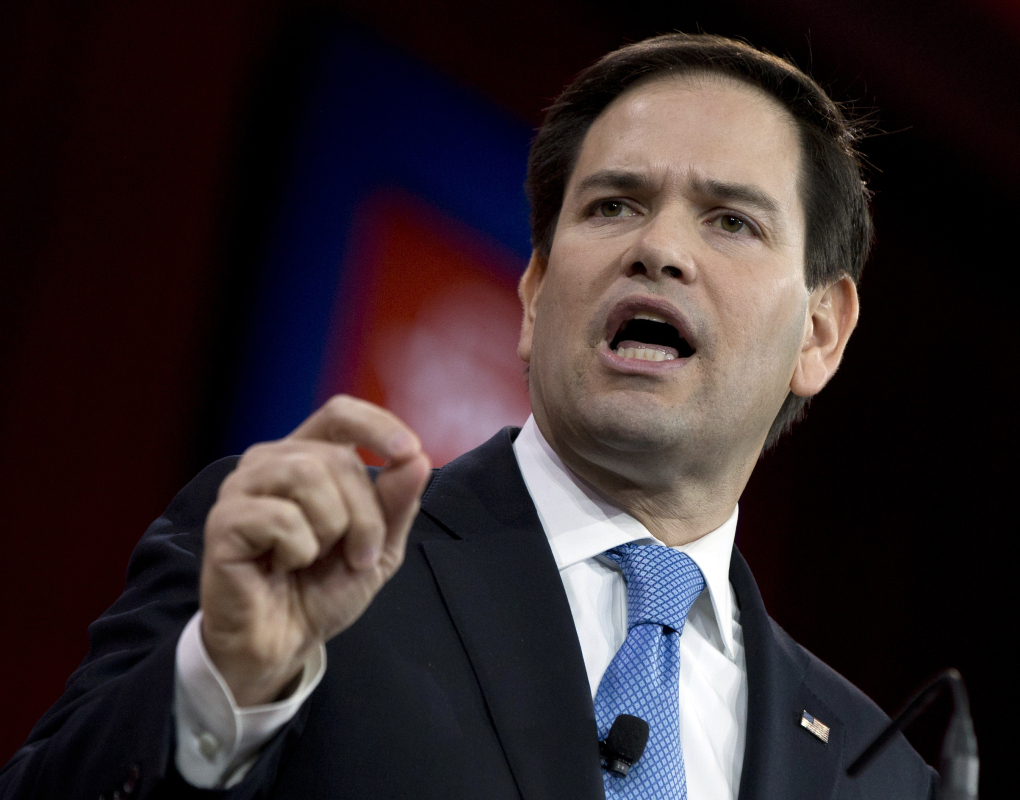
The South Florida Sun-Sentinel’s editorial on Wednesday that called on Marco Rubio to resign “and not rip us off” ignited a number of others to follow suit. It came as Rubio has continued to miss votes in the upper chamber of Congress while on the campaign trail and unapologetic about it. Instead, he’s indicated he doesn’t even really like the job. Historical precedent, though, indicates that if Rubio quit, it would be the exception to usual presidential politics. On his Smart Politics blog, Eric J. Ostermeier of the University of Minnesota writes that since 1972 there have been a total of 50 presidential candidacies by 45 sitting U.S. senators. Only one of these resigned before the presidential election: Bob Dole of Kansas in 1996. Dole only did so, in June 1996, after he had already secured the GOP nomination, and after the last batch of presidential primaries. During the past 40 plus years no other sitting U.S. senator running for the White House cut short their day job before the presidential election. Like Rubio, several of those senators were running for president in cycles in which their term in the nation’s upper legislative chamber was coming to an end – 12 in all: Four opted not to run for re-election: Democrat Fred Harris of Oklahoma (1972), North Carolina Democrat John Edwards (2004), Florida Democrat Bob Graham (2004), and Florida Republican Marco Rubio (2016) Seven failed in their presidential bids but still won re-election to their U.S. Senate seats that cycle: West Virginia Democrat Robert Byrd (1976), Texas Democrat Lloyd Bentsen (1976), Washington Democrat Scoop Jackson (1976), Kansas Republican Bob Dole (1980), Texas Republican Phil Gramm (1996), Utah Republican Orrin Hatch (2000), and Delaware Democrat Joe Biden (2008) One is currently running for both offices: Kentucky Republican Rand Paul (2016) And one stat where Rubio would definitely like to emulate Barack Obama: Of those 50 senators who have run for president since 1972, only one – Obama – actually became president. Much has been made of Rubio’s voting record. He’s missed about 34 percent of his from from the start of the year through last week. However, as reported by PolitiFact, from 2007 to 2008, Obama missed more than 64 percent of votes. From 2003 to 2004, John Kerry missed 72 percent of votes, and former Florida Sen. Graham missed about 37 percent of his votes when he ran in 2003-2004. Ironically, the man that Rubio succeeded in the Senate, Mel Martinez, did leave his seat more than a year before his term was set to expire.


